新编实用英语综合教程2第四版
新编实用英语2(第四版)教学大纲

新编实用英语2(第四版)教学大纲-CAL-FENGHAI-(2020YEAR-YICAI)_JINGBIAN郑州信息工程职业学院基础部《新编实用英语Ⅱ》课程教学大纲课程编码:9999010062总学时:72 学时实验学时:无学分:3学分适用对象:一年级学生先修课程:《新编实用英语Ⅰ》一、课程的性质与任务(一)本课程的性质大学英语课程是非英语专业学生必修的一门基础课程。
旨在培养学生的英语综合应用能力,使他们在今后工作和社会交往中能用英语有效地进行书面信息交流,提高综合文化素养,以适应社会发展和经济建设的需要。
《新编实用英语Ⅱ》是我院高职一年级学生第二学期所有学生学习和掌握英语听,说,读,写基本技能的基础课。
(二)本课程的任务本课程在高职高专院校中人才培养计划中是必修课程。
该课程理论与技能培养并重,相互结合,培养各类高职高专的应用型人才。
经过学习,使学生掌握一定的英语基础知识和技能,具有一定的听说读写译的能力,从而能借助词典翻译和阅读有关英语资料,使学生在今后的工作和社会交往日常活动中能用英语有效地进行口头和笔头交流,并为今后进一步提高英语的交际能力打下基础。
为此,该课程将努力做到以下三个方面:l、培养学生英语综合应用能力具有较强的阅读能力和良好的听、说、写、译能力,使他们能用英语交流信息。
2、增强学生的学习能力、特别是自主学习能力。
3、提高学生的综合文化素养。
(三)本课程培养人才的定位该课程是我院各专业学生必修的一门公共基础课程,旨在培养学生的英语综合应用能力(听、说、读、写、译),使他们在今后工作中与社会交往中能用英语有效地进行信息交流,提高综合文化素养,以适应社会发展日益国际化的需要。
(四)本课程在人才培养过程中的作用经过本课程的学习,使学生扎实语音、语法、词汇和基本句型等语言基本功,强化并提高听、说、读、写、译的综合能力,提高学生就业竞争力。
二、课程的基本要求通过学习本课程,学生应该达到以下要求:1、词汇认知 2500 个英语单词(包括入学时要求掌握的 1000 个词) 以及由这些词构成的常用词组,对其中 1500个左右的单词能正确拼写,能进行英汉互译。
新编实用英语综合教程第四汉译英答案
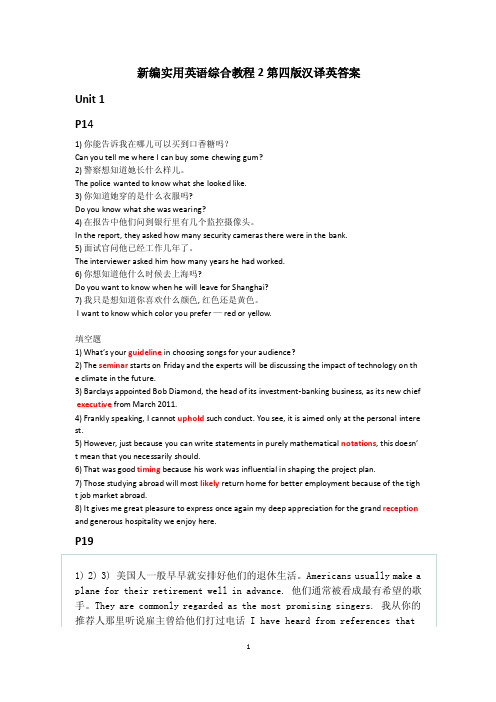
新编实用英语综合教程2第四版汉译英答案Unit 1P141) 你能告诉我在哪儿可以买到口香糖吗?Can you tell me where I can buy some chewing gum?2) 警察想知道她长什么样儿。
The police wanted to know what she looked like.3) 你知道她穿的是什么衣服吗?Do you know what she was wearing?4) 在报告中他们问到银行里有几个监控摄像头。
In the report, they asked how many security cameras there were in the bank.5) 面试官问他已经工作几年了。
The interviewer asked him how many years he had worked.6) 你想知道他什么时候去上海吗?Do you want to know when he will leave for Shanghai?7) 我只是想知道你喜欢什么颜色, 红色还是黄色。
I want to know which color you prefer — red or yellow.填空题1) What’s your guideline in choosing songs for your audience?2) The seminar starts on Friday and the experts will be discussing the impact of technology on the climate in the future.3) Barclays appointed Bob Diamond, the head of its investment-banking business, as its new chief executive from March 2011.4) Frankly speaking, I cannot uphold such conduct. You see, it is aimed only at the personal intere st.5) However, just because you can write statements in purely mathematical notations, this doesn’t mean that you necessarily should.6) That was good timing because his work was influential in shaping the project plan.7) Those studying abroad will most likely return home for better employment because of the tigh t job market abroad.8) It gives me great pleasure to express once again my deep appreciation for the grand reception and generous hospitality we enjoy here.P191) 2) 3) 美国人一般早早就安排好他们的退休生活。
实用英语综合教程2第四版教学设计
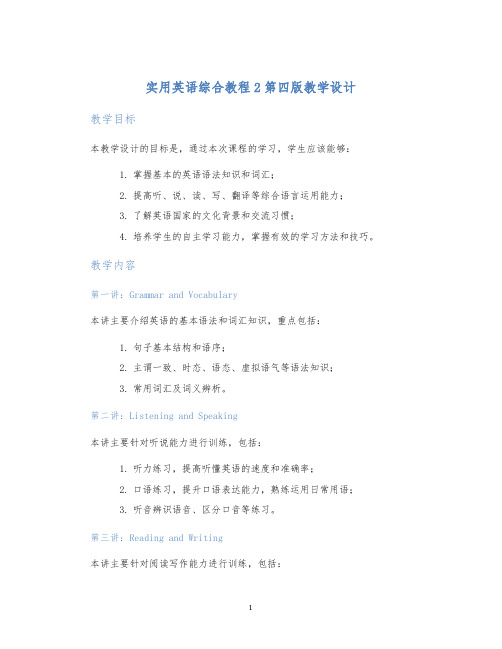
实用英语综合教程2第四版教学设计教学目标本教学设计的目标是,通过本次课程的学习,学生应该能够:1.掌握基本的英语语法知识和词汇;2.提高听、说、读、写、翻译等综合语言运用能力;3.了解英语国家的文化背景和交流习惯;4.培养学生的自主学习能力,掌握有效的学习方法和技巧。
教学内容第一讲:Grammar and Vocabulary本讲主要介绍英语的基本语法和词汇知识,重点包括:1.句子基本结构和语序;2.主谓一致、时态、语态、虚拟语气等语法知识;3.常用词汇及词义辨析。
第二讲:Listening and Speaking本讲主要针对听说能力进行训练,包括:1.听力练习,提高听懂英语的速度和准确率;2.口语练习,提升口语表达能力,熟练运用日常用语;3.听音辨识语音、区分口音等练习。
第三讲:Reading and Writing本讲主要针对阅读写作能力进行训练,包括:1.阅读练习,提高阅读理解能力,培养阅读策略和速度;2.写作练习,包括书面表达、写作技巧和指导等;3.语言转换练习,比如翻译、改写、修改等。
第四讲:Culture and Communication本讲主要介绍英语国家的文化背景和交流习惯,包括:1.社交礼仪和文化习俗等;2.国家文化底蕴和历史沿革;3.商务交际技巧和实例。
第五讲:Learning Strategies and Skills本讲主要介绍学习方法和技巧,帮助学生掌握有效的自主学习能力,包括:1.学习计划和进度安排;2.学习心理和认知策略;3.知识管理和阅读方法。
教学方法本教学设计采用“任务型教学”方法,通过实际交际任务来促进学生的语言学习和应用。
同时,采用“多元智能教学”方法,鼓励学生发挥自身的多元智能,在语言运用中有所突破和创新。
教学评价本教学设计通过多种方式对学生的语言能力和学习进度进行评价。
主要评价方式包括:1.课堂表现评价,包括听、说、读、写、翻译等语言技能;2.作业评价,包括阅读、写作、口头表达等作业完成情况;3.考试评价,包括期中、期末等阶段性考试;4.自我评价和互评,通过学生自评和互评等方式,促进学生主动参与学习和交流。
新编实用英语综合教程2第四版汉译英答案
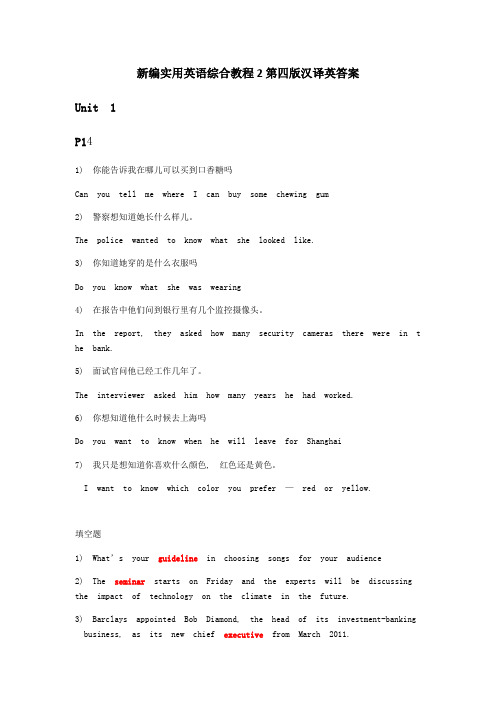
新编实用英语综合教程2第四版汉译英答案Unit 1P141) 你能告诉我在哪儿可以买到口香糖吗Can you tell me where I can buy some chewing gum2) 警察想知道她长什么样儿。
The police wanted to know what she looked like.3) 你知道她穿的是什么衣服吗Do you know what she was wearing4) 在报告中他们问到银行里有几个监控摄像头。
In the report, they asked how many security cameras there were in t he bank.5) 面试官问他已经工作几年了。
The interviewer asked him how many years he had worked.6) 你想知道他什么时候去上海吗Do you want to know when he will leave for Shanghai7) 我只是想知道你喜欢什么颜色, 红色还是黄色。
I want to know which color you prefer —red or yellow.填空题1) What’s your guideline in choosing songs for your audience2) The seminar starts on Friday and the experts will be discussing the impact of technology on the climate in the future.3) Barclays appointed Bob Diamond, the head of its investment-banking business, as its new chief executive from March 2011.4) Frankly speaking, I cannot uphold such conduct. You see, it is a imed only at the personal interest.5) However, just because you can write statements in purely mathemati cal notations, this doesn’t mean that you necessarily should.6) That was good timing because his work was influential in shaping the project plan.7) Those studying abroad will most likely return home for better emp loyment because of the tight job market abroad.8) It gives me great pleasure to express once again my deep appreci ation for the grand reception and generous hospitality we enjoy here.P19Unit 2P381)你需要的是更多的锻炼。
新编实用英语2第四版Unit-five-Food-Culture资料讲解

Steven: Sure. Let me ppoouurr it for you. Say when. Zhang: Thank you. That’s enough.
倒出 (液体)
Steven: OK. Help yourself to more meat if you want.
5) Let me pay the bill / check.
Li Ming: Let me pay the bill today.
Tom: Oh, no! Let’s ggooDDuuttcchh . We’re both students after all. AA制 (各付各的账) Li Ming: OK. It’s 15 dollars altogether. So 7 dollars and 50 cents
each. Right? Tom: That’s right. Waiter, bring the bill, please.
Back
Unit | Five
2 Work in pairs and perform the tasks by following the above mini-talks. Refer to the Data Bank in the Workbook for relevant expressions.
Unit | Five
3) I’d like something typically Chinese.
Window on Key Words
Waiter: Hello, Madam. May I help you?
Jenny: Yes. I’d like something typically Chinese.
新编实用英语2第四版Unit one Invitation Etiquette
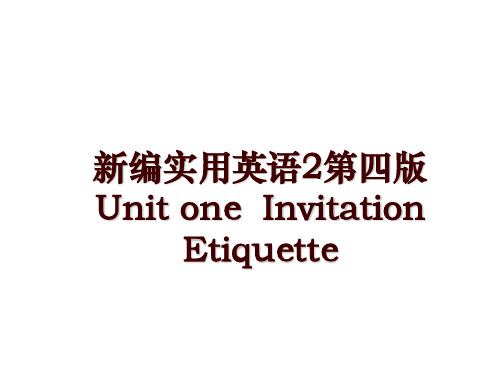
Unit Goals
Talking Face to Face
Being All Ears
Maintaining a Sharp Eye
Trying Your Hand
Warm-up Questions:
What are the two cards you are reading now?
Questions for the first invitation card:
Being All Ears
Maintaining a Sharp Eye
Trying Your Hand
Sample 1
Inviting Friends to a Party
Wang: Hello, William. What are you doing tomorrow evening? William: Tomorrow evening? Nothing special, I was thinking of watching TV. Wang: Drag yourself away from television for a change. I’m having a few friends to have a dinner party tomorrow to celebrate my daughter’s birthday. How would you like to join us?
Maintaining a Sharp Eye
Trying Your Hand
Unit Goals
1.What Students Should Learn to Do:
a. Making an oral invitation: Inviting people to join in daily activities Inviting people to formal occasions b. Making a written invitation: Writing an invitation card or a letter for: Personal invitations Official invitations c. Giving a reply to: An oral invitation A written invitation
新编实用英语2第四版Unit_four__hotel_service

Back
Unit | Four
Acting out the Tasks
Speak and Perform
2 Work in pairs and act out the tasks by following the above mini-talks.
Lynda: It’s Lynda Miller. The telephone number is 854-1742.
2) I have made a room reservation here. Jane: Good evening. I have made a room reservation here. Clerk: Let me check. Yes, there it is. A single room for one night. Jane: Yes, I’m leaving tomorrow. Clerk: Then you have to check out before 2 o’clock P.M.
Receptionist: Thank you, and here is the registration form for you to fill in.
4) I’m Awfully sorry. Tom: I’d like to book a single room for two nights.
Back
Unit | Four
3) Would you please show me your passport? Catherine: I would like to stay in this hotel for a couple of days.
新编实用英语综合教程2第四版-精品PPT课件
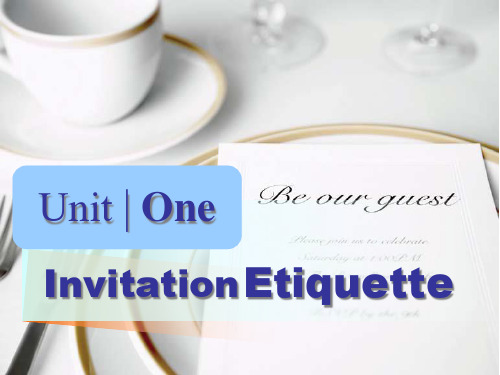
Putting Language to Use
Speak and Complete Speak and Translate Speak and Communicate
Unit | One
SECTION I Talking Face to Face
Imitating Mini-talks
Speak and Recite
2) Inviting friends to a dinner Mary: We’d love to have you over for dinner Saturday.
Robert: Oh, thank you. What time should I come? Mary: How about eight o’clock?
Being All Ears
Section Ⅲ
Contents
Section Ⅴ
Appreciating Culture Tips
Section Ⅳ
Maintaining a Sharp Eye
Trying Your Hand
Unit | One
Section I Talking Face to Face
really special. Cindy: Oh, thanks, but ... maybe some other time. I’m very busy tonight.
Window on Key Words
好极了
祝贺
滑旱冰
Back
Unit | One
Acting out the Tasks
Unit | One Invitation Etiquette
Unit | One
Unit Goals:
新编实用英语综合教程2第四版Unit-two--Communication-by-email(课堂PPT)

Li Li: Really? What does it say?
Paul: New slang has been invented in recent years by students, especially as they
get access to the Internet and chat online.
4 Task: Discuss some slang words used in emails.
5 Task: Talk about the meaning of a new slang you’ve come across in your e-mail messages.
● Refer to the Data Bank in the Workbook for more relevant expressions.
Unit | Two
1 Unit | Two
Unit Goals:
What You Should Learn to Do
1. Chat online 2. Us e abbreviations and slangs in communicating online 3. Write an e-mail
Li Hong: Oh, really. I remember I once ran into “TTYL” while chatting with somebody online.
Let me have a guess. Does it mean “talk to you later”?
Back
Mike: That’s right. You are really smart.
Mike: Chatting online.
新编实用英语2第四版Unit--two--Communication-by-email

describe the Internet addicts.
Let me have a guess. Does it mean “talk to you later”?
Back
Mike: That’s right. You are really smart.
Unit | Two
2) New Slang Joins Campus Internet Talk
Li Li: Anything interesting in the paper today?
“bye for now”; “BS” means “big smile”; “FTTB” means “for the time being”; and so on.
Li Hong: Oh, I see. How interesting! Now I can guess what these abbreviations might mean.
“GNBLFY” he used. Mike: Neither do I. Let’s make a guess. Hilary: Mm, let me see. Oh, it might mean “got nothing but love for you”.
2) Talking about cyber slang used in e-mails May: Hi, Susan! I am reading an e-mail from Tom.
Paul: Let me have a look. Well, there is one article about new slang.
Li Li: Really? What does it say?
Paul: New slang has been invented in recent years by students, especially as they
新编实用英语2第四版Unit four hotel service

新编实用英语2第四版Unit four hotelserviceUnit Four: Hotel ServiceIntroduction:In the modern era of globalization, the need for effective communication in the English language has become crucial, especially in the hospitality industry. Being able to provide excellent hotel services to international guests requires proficiency in English communication skills. This article aims to explore the contents and concepts covered in the fourth edition of the book "New Practical English 2: Hotel Service."Chapter 1: Checking InThe first chapter of the book focuses on the crucial process of checking in guests at a hotel. It covers various aspects such as greeting guests, confirming reservations, and providing necessary information. It emphasizes the importance of clear communication to ensure a smooth check-in experience. Topics covered include:1.1 Greeting Guests- Properly welcoming guests with appropriate greetings and expressions.- Offering assistance and addressing any initial concerns or requests.1.2 Confirming Reservations- Verifying guest information, including names, duration of stay, and room preferences.- Handling reservations made through different channels (online, phone, or in-person).1.3 Providing Information- Communicating essential details about the hotel facilities, amenities, and services.- Informing guests about additional charges, policies, and procedures.Chapter 2: Room ServiceThe second chapter delves into the area of room service, which plays a vital role in ensuring guest satisfaction during their stay. It covers procedures for taking orders, delivering food and beverages, and handling special requests. Key topics include:2.1 Taking Orders- Learning how to effectively communicate with guests to obtain their desired food and beverage choices.- Understanding dietary restrictions, allergies, and preferences.2.2 Delivering Food and Beverages- Properly presenting and serving meals in accordance with hotel standards.- Ensuring accuracy in delivering orders to the correct room and guest.2.3 Handling Special Requests- Dealing with special dietary requirements or specific guest preferences.- Addressing complaints or concerns related to room service promptly and professionally.Chapter 3: Concierge ServicesThe third chapter focuses on the role of the concierge, who acts as a valuable resource for hotel guests seeking assistance and information. It covers topics such as providing directions, arranging transportation, and recommending local attractions. Key points covered include:3.1 Offering Directions- Assisting guests in navigating the local area, including providing maps and giving clear instructions.- Suggesting alternative routes to optimize guests' travel experience.3.2 Arranging Transportation- Organizing transportation services, such as taxis, shuttles, or rental cars.- Advising guests on the most convenient and cost-effective options.3.3 Recommending Local Attractions- Knowledgeably suggesting popular tourist spots, local events, and cultural activities.- Tailoring recommendations based on guests' interests and preferences.Conclusion:The fourth edition of "New Practical English 2: Hotel Service" provides comprehensive guidance on different aspects of hotel service in the Englishlanguage. The book helps hotel professionals enhance their communication skills, ensuring they can effectively interact with international guests. By mastering the contents covered in this edition, hotel staff can elevate the overall guest experience and contribute to the success of the hospitality industry.。
新编实用英语2第四版Unit_1_Invitation_Etiquette
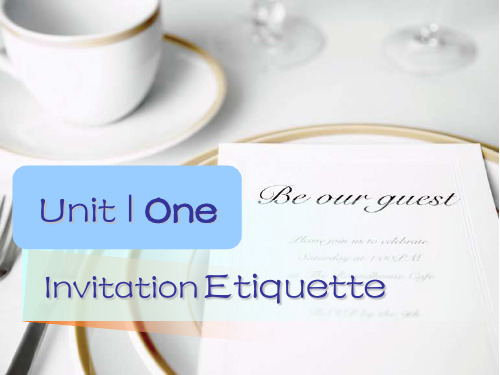
好极了
祝贺
滑旱冰
精品课件
Back
Unit | One
Acting out the Tasks
Speak and Perform
weekend. Molly: Oh, why not? 4) Declining an invitation to go roller-skating Mike: Would you like to go roller-skating with me this Saturday afternoon? Sarah: Saturday afternoon? I’m afraid I won’t be able to. Mike: What about Sunday afternoon? Sarah: That would be nice. 5) Declining an invitation to go out to dinner Steve: Well, thank goodness it’s Friday, Jean. Cindy: Yes, it was a long week, Ken. Steve: Would you like to go out to dinner tonight? I’d like to take you somewhere
2 Work in pairs and act out the tasks by following the above mini-talation (write an invitation card or a letter) for: personal invitation official occasions
新编实用英语2第四版Unit--two--Communication-by-email

to enter a completely different world. You can leave your own world behind, and
go somewhere really virtual.
5) Talking about the experience of surfing the Internet
Unit | Two
Unit | Two
Unit Goals:
What You Should Learn to Do
1. Chat online 2. Us e abbreviations and slangs in communicating online 3. Write an e-mail
Mike: Chatting online seems like fun. Have you ever tried it?
Lily: I recently have!
Mike: How do you feel about it?
Lily: I just love it. It’s the most exiting thing I’ve ever done.
“GNBLFY” he used. Mike: Neither do I. Let’s. Oh, it might mean “got nothing but love for you”.
2) Talking about cyber slang used in e-mails May: Hi, Susan! I am reading an e-mail from Tom.
What You Should Know About
1. Surfing online for: information shopping
新编实用英语2第四版Unit six Shopping and Sightseeing
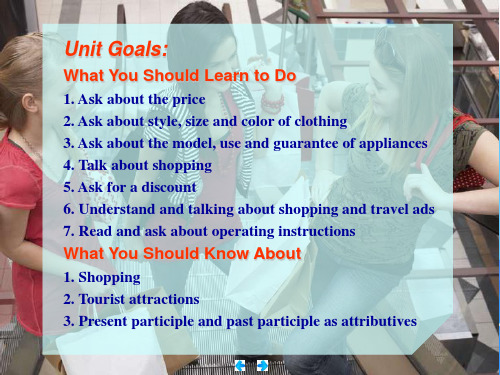
Peter: Me too. I love the galleries in London, but I like the ones in Paris even
more.
Back
Putting Language to Use
Speak and Complete
5 Imagine you are buying a cassette recorder. Complete the following conversation with the shop assistant by filling in the blanks.
You: About one hundred dollars, I think. Shop assistant: If so, I’ll show you a very good cassette recorder on sale.
Being All Ears
Section Ⅲ
Contents
Section Ⅴ
Appreciating Culture Tips
Section Ⅳ
Maintaining a Sharp Eye
Trying Your Hand
Section Ⅰ Talking Face to Face
Imitating Mini-talks
Speak and Complete Speak and Translate Speak and Communicate
SECTION I Talking Face to Face
Imitating Mini-talks
Speak and Recite
1 Work in pairs. Look at the picture and recite the following mini-talks for shopping and sightseeing.
新编实用英语2第四版Unit-five-Food-Culture资料讲解

Back
Unit | Five
Script:
1) Would you like something to drink? 2) I’d like a glass of beer, please. 3) I’d like to book a table for six this Friday evening. 4) Is this table available? 5) May I take your order now? 6) Which do you prefer, meat or fish? 7) Will you try some seafood? 8) May I have the menu, please? 9) I’d rather have some light food today. 10) Waitress, bring me the bill, please.
Waitress: It will be ready any minute, sir. Kim: What’s holding it up? I gave you our order over twenty minutes ago.
Waitress: I’m sorry. We’re very busy. Kim: I hate to complain, but we’re on our lunch hour. Do you think you could speed things up?
Water: This way, please. Is this table alright? Jane: I would prefer the one near the window.
Water: Sorry, it was rreesseerrvveedd an hour ago. How about that one? Jane: That’s OK. Thank you.
